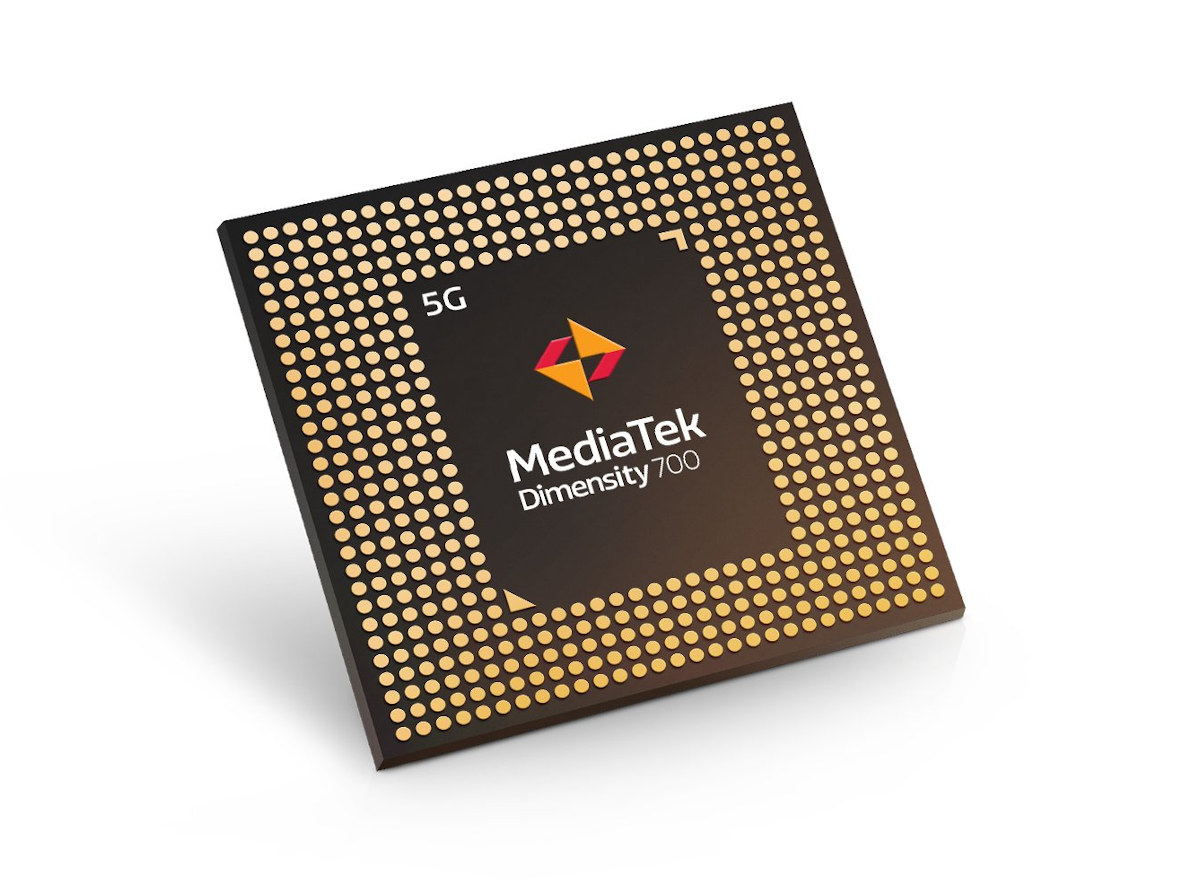MediaTek announced three new 6nm and 7nm processors yesterday with Dimensity 700 5G processor for mainstream 5G mobile phones, and MT8192 & MT8195 SoCs for Chromebooks.
MediaTek Dimensity 700
Key features and specifications with highlights showing differences against Dimensity 720:
- Octa-core Processor – 2x Arm Cortex-A76 @ up to 2.2 GHz, and 6x Arm Cortex-A55 @ up to 2GHz
- GPU – Arm Mali-G57 MC2 @ up to 950 MHz
- AI Accelerator – MediaTek APU
- System Memory – Up to 12GB LPDDR4x up to 2133MHz
- Storage – UFS 2.2
- Display – Up to 2520 x 1080 resolution with 90Hz max refresh rate
- Camera
- ISP up to 16MP+16MP @ 30 fps dual camera, or 64MP @ 22 fps single camera
- Video Capture Resolution up to 3840 x 2160
- Features – HDR-ISP, Multi-Frame NR, 3D Noise Reduction, Depth Engine, Warping Engine, AI-FD
- Video
- Encoding – H.264, H.265 / HEVC up to 2Kp30
- Playback – H.264, H.265 / HEVC, VP9 up to 2Kp30
HDR10+ Enhanced with “Local Tone Mapping”
- Connectivity
- Cellular
- 5G FDD / TDD
- SA & NSA modes sub-6GHz networks; SA Option2, NSA Option 3/3a/3x
- NR TDD Band, NR FDD Band,
- DSS, NR DL 2CC, 100 MHz bandwidth, 256QAM NR UL 2CC, 256QAM VoNR / EPS fallback
- Peak Download Speed – 2.77Gbps
- 5G UltraSave
- 4G FDD / TDD with Carrier Aggregation (CA)
- 3G CDMA2000 1x/EVDO Rev. A (SRLTE), TD-SCDMA, WCDMA
- 2G EDGE, GSM
- 5G FDD / TDD
- 802.11b/g/n/ac WiFi 5
- Bluetooth 5.1
- GNSS – GPS, QZSS L1+ L5, Galileo E1 + E5a, BeiDou B1C + B2a, NAVIC
- Cellular
- Process – TSMC 7nm
Compared to Dimensity 720, Dimensity 700 has a slightly higher big core frequency (2.2 GHz vs 2.0 GHz), and 5G peak download speed (2.77 vs 2.3 Gbps), but multimedia and graphics capabilities are lower with no 4K support, a dual-core GPU instead of one with three core, and lower dual-camera resolution.
Dimensity 700 should be found phones selling for less than $250 starting next year. You may find more details on the product page.
MediaTek MT8192 & MT8195
The Taiwanese company also announced two Chromebooks processor with MT8192 designed for mainstream Chromebooks and MT8195 for premium models.
MT8192 specifications highlights:
- CPU – 4x Arm Cortex-A76 @ 2.2GHz, 4x Arm Cortex-A55 @ 2.0GHz
- GPU – Arm Mali-G57 MC5
- AI Accelerator – 2.4 TOPS NPU
- Memory – LPDDR4x @ 2133 MHz
- Storage – eMMC 5.1, UFS 2.1
- Display – Up to 2560 x 1440 (WQHD) or 2x 1920 x 1080
- Video
- Encode – 4K H.264, H.265 / HEVC
- Decode – 4K H.264, H.265 / HEVC, VP9
- Camera
- Camera ISP – 16MP+16MP, 32MP
- Recording Resolution -3840 x 2160
- Connectivity
- Dual-band 802.11a/b/g/n/ac WiFi 5
- Bluetooth
- GNSS – GPS, Glonass, BeiDou, Galileo, QZSS
- USB – USB 3.2 Gen 1
- Expansion – PCIe Gen 3
- Process – TSMC 7nm
There are fewer details about the 6nm MediaTek MT8195 processor, but it will be made for premium Chromebooks with four Arm Cortex-A78 cores for compute-intensive applications and four power-efficient Arm Cortex-A55 cores, a MediaTek’s APU 3.0 providing up to 4 TOPS performance, and support for up to three independent displays.
If I understand the press release correctly, the new MT8195 processor will apparently come with the same penta-coreMali-G57 GPU, add support for AV1 video hardware decoding, Dolby Vision and 7.1 surround sound audio.
MediaTek expects Chromebooks powered by the MT8192 to hit the market in Q2 2021, while MT8195 will be found in premium Chromebooks, smart displays, tablets, and other smart devices at a later date. Check out MT8192’s product page for more information.

Jean-Luc started CNX Software in 2010 as a part-time endeavor, before quitting his job as a software engineering manager, and starting to write daily news, and reviews full time later in 2011.
Support CNX Software! Donate via cryptocurrencies, become a Patron on Patreon, or purchase goods on Amazon or Aliexpress






Lets hope for some new open SBCs with the MT8192.
Yes, BUT Mediatek doesn’t get the same level of SBC/Linux as Rockchip and I don’t know why.
So far all mtk based SBCs have developend into paper weights due to SW quality, an Android kernel with a 2 years old Ubuntu userland makes no viable linux SOC…
Manufacturers targeting the US market may be influenced by US trade embargo against Chinese SoC producers such as Rockchip and, therefore prefer Taiwanese product.
Hope and pray.
MT8195 is more interesting since it adds AV1 decode, and what, 30-50% more performance from the Cortex-A78?
2.2 GHz is unimpressive for 7 nm process. Given that Odroid N2+ is already available offering 2.2 GHz out of the box with a good passive cooling solution included, what does this SoC promise? Maybe > 4GB RAM and M.2 alongside USB 3. I’d be looking for 3 GHz or more.
It’s not the 1990s anymore, so performance is no longer something you measure by clock speed.